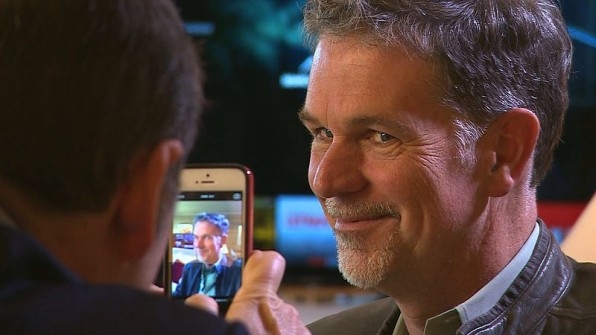10 ways to get axed at Netflix
Netflix is a hugely successful company, and it holds its (very well-paid) employees to very high standards. The best way to survive there, apparently, is to outperform, constantly. And, according to the Wall Street Journal’s account, CEO Reed Hastings wants its people to be talking and thinking about their survival pretty much all the time.
In that kind of culture, things like this happen, the Journal reports:
1. “Last year, he [Hastings] fired Neil Hunt, the longtime chief product officer who had helped create Netflix’s famed algorithm that curates programming for viewers. He was one of Netflix’s earliest employees and had been Mr. Hastings’ close friend for decades. Mr. Hastings told Mr. Hunt a lot had changed, as Netflix expanded in Hollywood and overseas, and one of Mr. Hunt’s underlings, Greg Peters, was now more suited for the job.”

[Image: Wikipedia / cellanr]
2. “Ernie Tam, who had worked as a Netflix engineer for six years, was called into his manager’s office on a Monday morning in 2015. ‘You’re no longer a star performer,’ the manager said. An HR representative came in, discussed Mr. Tam’s severance package and took his laptop. ‘I just left the office and never came back,’ Mr. Tam said.”
3. “One former employee remembers seeing a woman who was just fired crying, packing up her boxes, while the rest of her team shied away from the scene without offering any support. They feared that ‘helping her would put a target on their back,’ the employee said.”
4. “A former marketing vice president had been working all weekend on a marketing shoot in 2014 to promote the second season of Orange Is the New Black in New York City. During the weekend, her boss, Chief Marketing Officer Kelly Bennett, scheduled a Monday morning meeting, saying he and then-Chief Talent Officer Tawni Nazario-Cranz would stop by on their way from California to London.” [Guess what happened next.]
5. “The emails about firings can reach hundreds of employees across multiple divisions and can be painfully specific, calling out an employee’s flaws, while inviting more questions and gossip, many employees say.”
6. “Chief Financial Officer David Wells sent an email in August to employees saying he ‘decided to exit’ David Burt, a vice president. ‘It is now clear that David was not forthright with us around a major employee issue that impacted the business even when directly asked,’ he wrote in the email. A person familiar with the case said the ’employee issue’ referenced in the email involved a sensitive medical condition and that Mr. Burt had acted to protect the person’s privacy and confidentiality.”
7. “When Netflix’s Singapore office opened in 2016, employees said they were shocked by the frequency of firings. A Korean employee who left earlier this year from the Singapore office said the culture encouraging harsh feedback at times reminded her of North Korea, where mothers are forced to criticize their sons in front of the public.”
8. “Belle Baldoza, a former public-relations manager in Singapore, got into trouble with human resources when she asked co-workers if they wanted to chip in to help out a receptionist who was fired during Chinese New Year and wasn’t eligible for severance because he worked on contract, people familiar with the incident said. Human resources officials told her such a collection was not the ‘Netflix way’ and was ‘not in the best interest of the business,’ the people said.”
9. “At a Netflix Inc. corporate retreat in July, Chief Executive Reed Hastings teared up as he addressed some 500 executives. Mr. Hastings had recently fired his chief communications officer for saying the ‘N-word’ in full form. The executive in question, Jonathan Friedland, ‘sunshined’ his misdeed—Netflix lingo for an apology or act of transparency in front of colleagues—in the hopes it would blow over. It didn’t.” [Friedland was fired.]
10. “Several years ago, Mr. Hastings ‘sunshined’ in an executive meeting that he had authorized the company to give unusual, significant cash sums to a couple of senior executives, including Ms. Nazario-Cranz, the chief talent officer, to help buy houses in the Bay Area, people familiar with the matter said . . . Mr. Hastings was dubious when he found that the executive [again, the talent officer, Nazario-Cranz] had taken some of her team to get their hair done and bought makeup on the company’s dime ahead of a launch event in Milan a few years ago. Mr. Hastings asked her to “sunshine” what she did in front of dozens of top executives.”
[Nazario-Cranz later left due to a heart condition and “a desire to spend more time with her children.”]
(7)



